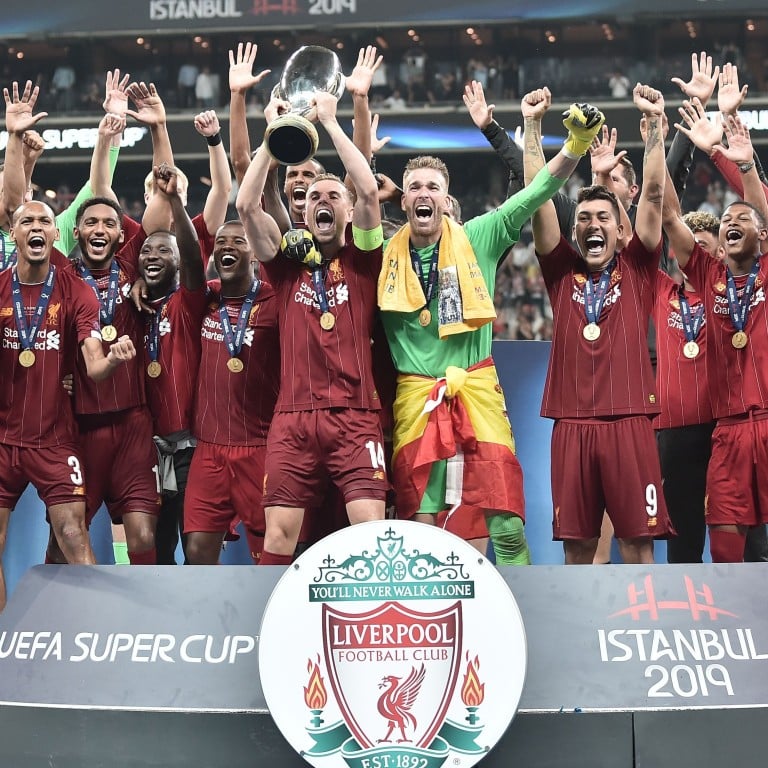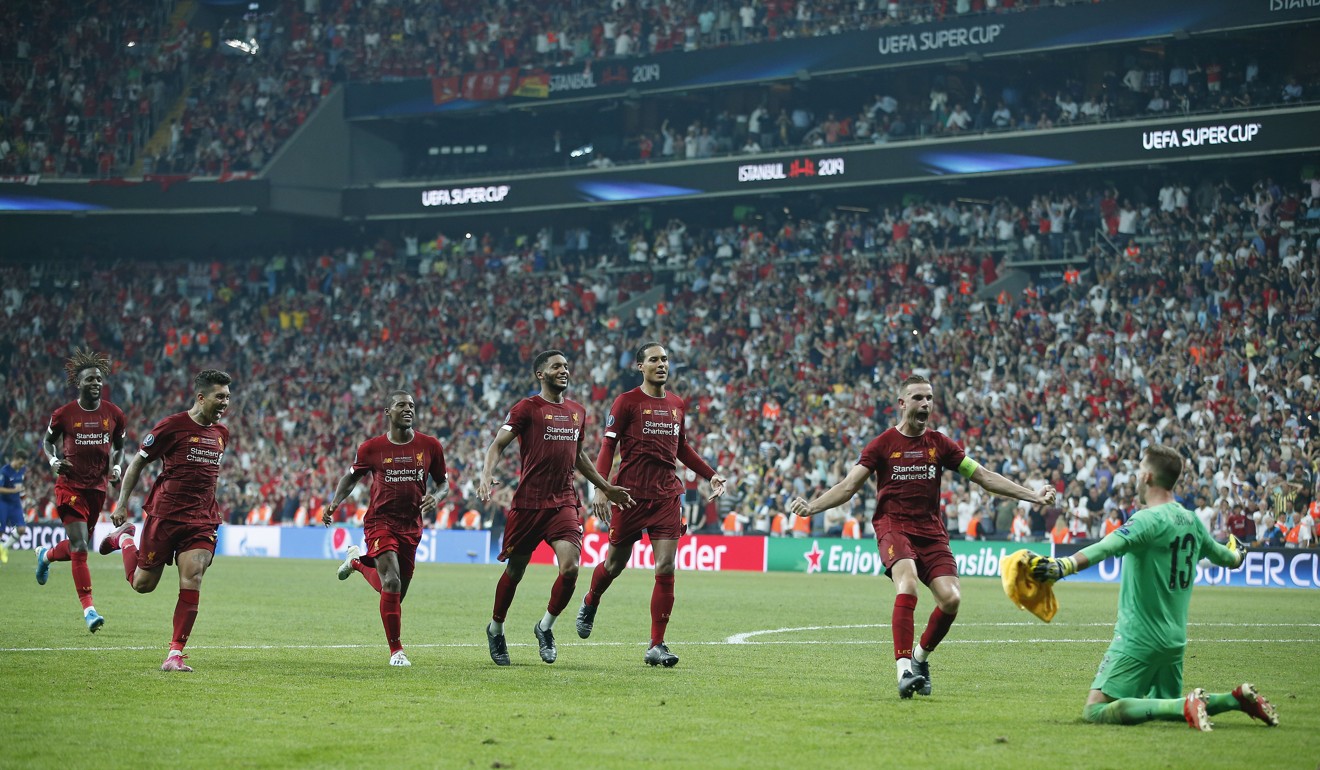
Liverpool topping Manchester United’s global pulling power (no wonder Everton have the blues)
- Size and make-up of Uefa Super Cup crowd shows Liverpool are the side that everyone wants to see
- Myth that Everton are club with most support on Merseyside is a lie – just take a stroll through the streets where there are red shirts everywhere
There is a myth that Everton are the club with the most support on Merseyside. A stroll through the streets of Liverpool nails that lie. There are red shirts everywhere. There are plenty of blue ones, too, but the Liver Bird is much more prominent than the Prince Rupert’s Tower badge of Everton.
It’s tough being the second team in a city – especially because Goodison lorded it over Anfield for so many years. With Liverpool again European champions, blues take any consolation they can and the belief that they are more Scouse than their neighbours across Stanley Park is a key part of their identity.
Deep down, most Evertonians know that they are outnumbered in their own neighbourhoods. They can maintain the fallacy, however, by pointing to Liverpool’s huge out-of-town support.
It dwarfs the local fan base. At matches like Wednesday’s Super Cup game against Chelsea in Istanbul and the Champions League final in Madrid in June, the extraordinary scope of the club’s reach was visible.

Numerous nations and languages are represented. Very few teams could have packed out Vodafone Park, Besiktas’ stadium, for what is essentially a friendly on a Wednesday night. Chelsea fans were outnumbered by seven or eight to one.
Liverpool have always taken great pride in their global fame. In the mid-1970s a scarf was produced bearing the legend, “Liverpool FC: Supporters all over the world”. It featured a Liver Bird standing on a globe and, among others, the national flags of Canada, West Germany, Sweden and Denmark.
The seafaring nature of the city and the Scouse diaspora ensured that the team had a foothold in many countries – as did Everton – but this scarf was one of the first celebrations of the team’s international impact outside emigrant communities.
Jurgen Klopp’s Liverpool hope to shake off history with Premier League title challenge after ‘curse’ of second place
Even more than 40 years ago when travel was much more expensive and difficult, it was not unusual to hear foreign accents on the Kop.
The growth of televised football has allowed supporters in even the most remote regions the chance to follow teams but Liverpool’s resonance goes beyond that.
The Champions League victory in Istanbul in 2005, when Rafa Benitez’s side came back from being 3-0 down to AC Milan at half-time to win on penalties, was a turning point in the club’s history.

The team’s appeal exploded. The banks of the Bosporus teemed with Liverpool fans but the influx of supporters was dwarfed by the crowds who came to Athens for the rematch final with Milan two years later.
It seemed that almost everyone who arrived in Turkey without a ticket was able to find one for the Ataturk 14 years ago. In Greece there were none to be had and the night turned ugly as desperate supporters charged the gates.
Everything changed in the two years between the finals. Before Istanbul, travellers to games abroad arrived in foreign cities confident that they could pick up a precious ticket. That time was over. In Madrid in June tens of thousands came to the Spanish capital from all four corners of the planet knowing that there was no chance they could get into the Wanda. They were content to join in the festivities during the day and watch the game in a bar.

Liverpool have become a superclub. How many other teams in Europe could galvanise support like this? Manchester United, certainly. Celtic fans overwhelmed Seville in 2003 for their Uefa Cup final defeat by Porto. It is hard to imagine the Scottish side reaching a big European final in the foreseeable future, though.
Even Barcelona and Real Madrid do not bring the sheer numbers to their finals. Liverpool outnumbered Real supporters in Kiev last year. Only United have a similar drawing power and polyglot following.
Success feeds the phenomena and the Champions League victory over Tottenham Hotspur three months ago has swollen the ranks of Liverpool supporters again. Back in 2012 United claimed that they had 659 million adult fans – one in 10 of the world’s population at the time. It was a patently ludicrous assertion but no one could doubt the Red Devils’ box office appeal. Jurgen Klopp’s team have probably exceeded that pulling power now.

Liverpool may not be the biggest club in the world but they are surely the hottest. For the moment they are the side everyone wants to see. The size and make-up of the crowd at the Super Cup attests to that reality.
It is possible to have mixed feelings about this. The club have tried hard to ensure that local supporters understand how much they are valued but it is difficult at times to satisfy the expectations of fans within the city and global followers.
Even within the UK there are different sorts of supporters: Jacob Rees-Mogg’s two sons who were pictured in Liverpool shirts will have a different image of the club to boys of the same age from Bootle. Sometimes the culture gap leads to misunderstandings and friction but, largely, the various factions under the same umbrella rub along easily enough.

Perhaps the bigger threat is the direction in which European football is heading. The proposed changes to the Champions League – 32 teams divided into four groups of eight with two teams from each group relegated each year – will create a Super League by default.
Potential media partners like Netflix and Amazon have their eyes on a market where the clubs with global recognition play each other to massive worldwide audiences. They want super clubs. Local rivalries do not have the same resonance – or moneymaking potential – for intercontinental broadcasting companies.
Liverpool, with the increasingly international nature of their support, are well placed to profit from the upcoming new age. Everton are not. The fear is that, in the era of the mega-club, all Goodison will be left with are myths and memories. The vast majority of Liverpool’s support will not care because they don’t know what it’s like to be in the city on derby day. That’s the saddest part of it all.

